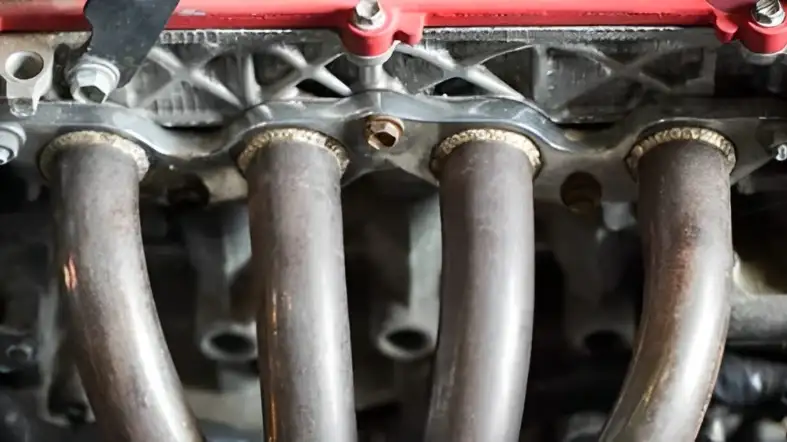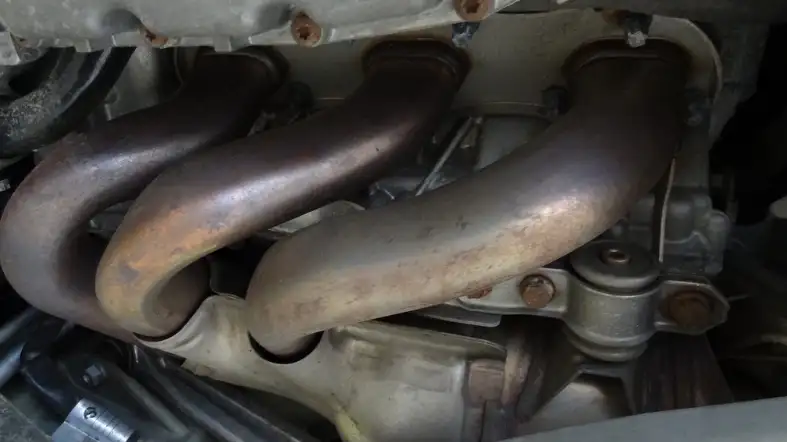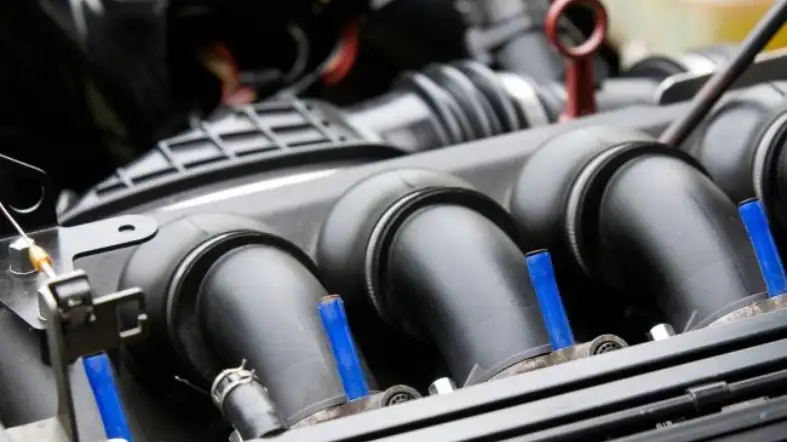Have you noticed a strange noise or smell coming from under the hood of your car?
If so, there’s a good chance you’re dealing with an exhaust manifold gasket leak.
Don’t worry, though – this is a relatively common issue that can be fixed with a bit of elbow grease and the right tools.
In this blog post, we’re going to explore the temporary fix for an exhaust manifold gasket leak.
Whether you’re a seasoned mechanic or a DIYer, this guide will walk you through the steps to get your car back on the road and running smoothly.
How to temporarily fix the exhaust manifold gasket leak?
If you’re experiencing an exhaust manifold gasket leak, it can be quite concerning.

This issue can lead to a range of problems, including reduced engine performance, strange noises, and even potential safety hazards.
In some cases, the best solution is to replace the gasket entirely.
However, there are some temporary fixes you can try to keep your car running smoothly until you can get a permanent fix.
Here’s what you’ll need:
1. A wrench or socket set to remove the bolts holding the exhaust manifold in place.
2. A scraper or wire brush to clean the surfaces where the gasket sits.
3. A new gasket, which you can purchase from an auto parts store or online.
4. High-temperature gasket sealer, which you can also find at an auto parts store.
Here are some steps you can take to temporarily fix an exhaust manifold gasket leak:
1. Identify the leak:
Before you can fix the issue, you need to know where the leak is coming from. Check for any visible cracks, breaks, or holes in the gasket.
You may also hear a hissing or popping sound coming from the engine.
2. Use a sealant:
One of the most common ways to temporarily fix an exhaust manifold gasket leak is by using a sealant.
This can be a liquid or a paste that you apply to the area where the leak is coming from. Make sure you follow the instructions carefully and apply the sealant evenly.
3. Use exhaust tape:
Another option is to use exhaust tape. This is a type of heat-resistant tape that you wrap around the area where the leak is coming from.
This can be a quick fix to get you to a mechanic or until you can replace the gasket.
4. Tighten the bolts:
In some cases, the leak may be caused by loose bolts. Check to see if any of the bolts holding the exhaust manifold in place are loose, and tighten them if necessary.
Be careful not to over-tighten, as this can cause damage.
5. Use a muffler patch:
If the leak is coming from the exhaust pipe itself, you can use a muffler patch to temporarily fix the issue.
This is a type of tape that you wrap around the damaged area, and it can withstand high temperatures.
What are the causes of an exhaust manifold gasket leak?

An exhaust manifold gasket leak can occur for a number of reasons, including:
1. Wear and Tear:
Over time, the exhaust manifold gasket can become worn out due to constant exposure to heat, vibration, and pressure.
This can cause it to crack, deform, or fail altogether, leading to a leak.
2. Poor Installation:
If the gasket was not installed correctly during the initial installation or replacement, it may not be able to withstand the high temperatures and pressure generated by the engine, leading to a leak.
3. Thermal Expansion and Contraction:
As the engine heats up during operation, the exhaust manifold and gasket expand. As it cools down, they contract.
This repeated expansion and contraction can cause the gasket to become brittle and crack over time.
4. Over-tightening of Bolts:
If the bolts that secure the exhaust manifold to the engine block are over-tightened, it can cause the gasket to be compressed too much, leading to damage and leaks.
5. Corrosion:
Exposure to moisture, road salt, and other corrosive substances can cause the exhaust manifold and gasket to corrode, leading to leaks.
6. Engine Misalignment:
If the engine is not properly aligned, it can cause excessive stress on the exhaust manifold gasket, leading to leaks.
7. Engine Overheating:
If the engine overheats, it can cause the exhaust manifold to warp or crack, which can damage the gasket and cause it to leak.
How to Prevent Exhaust Manifold Gasket Leak?

An exhaust manifold gasket leak can be a frustrating and expensive problem to deal with, as it can cause a variety of issues with your vehicle’s performance.
Fortunately, there are several steps you can take to prevent this from happening. Here are some tips:
1. Regular Maintenance:
One of the most important things you can do to prevent an exhaust manifold gasket leak is to ensure that your vehicle is regularly maintained.
This includes checking and replacing worn or damaged gaskets, tightening bolts and nuts, and ensuring that the exhaust system is properly secured.
2. Use High-Quality Gaskets:
When it comes to exhaust manifold gaskets, quality matters. Investing in high-quality gaskets can help to ensure a proper seal and prevent leaks.
Cheap gaskets may be tempting, but they are often prone to failure and can end up costing you more in the long run.
3. Avoid Overheating:
Overheating can cause damage to the exhaust manifold gasket and other components of the exhaust system.
To prevent overheating, ensure that your engine is properly maintained and that your cooling system is functioning correctly.
4. Avoid Extreme Temperatures:
Extreme temperatures can cause the exhaust manifold gasket to expand and contract, which can cause it to fail over time.
Avoid driving in extreme temperatures, such as hot summer days or cold winter nights, if possible.
5. Proper Installation:
Proper installation of the exhaust manifold gasket is crucial to preventing leaks.
Ensure that the gasket is properly aligned and that all bolts and nuts are tightened to the correct torque specifications.
FAQs
What Is An Exhaust Manifold Gasket?
An exhaust manifold gasket is a seal that sits between the exhaust manifold and the engine block.
Its job is to prevent exhaust gases from leaking out of the manifold and into the engine compartment.
How Can I Tell If My Exhaust Manifold Gasket Is Leaking?
Signs of a leaking exhaust manifold gasket may include a loud hissing or popping noise coming from the engine, a decrease in engine performance, or a noticeable exhaust smell inside the vehicle.
Why Should I Fix A Leaking Exhaust Manifold Gasket?
It’s important to fix a leaking exhaust manifold gasket as soon as possible, as it can lead to a number of issues, including decreased engine performance, decreased fuel efficiency, and potential damage to other engine components.
Can I Fix A Leaking Exhaust Manifold Gasket Myself?
While it is possible to fix a leaking exhaust manifold gasket yourself, it can be a challenging task that requires a fair amount of mechanical skill and knowledge.
If you’re not confident in your abilities, it may be best to seek the help of a professional mechanic.
Q: What Is A Temporary Fix For A Leaking Exhaust Manifold Gasket?
One temporary fix for a leaking exhaust manifold gasket is to use a high-temperature sealant designed for use with exhaust systems.
This can help fill in any gaps or holes in the gasket and prevent exhaust gases from leaking out.
However, it’s important to note that this is only a temporary fix and may not be a permanent solution.
How Long Will A Temporary Fix For A Leaking Exhaust Manifold Gasket Last?
The longevity of a temporary fix for a leaking exhaust manifold gasket will depend on a number of factors, including the severity of the leak, the quality of the sealant used, and the driving conditions of the vehicle.
In general, a temporary fix may last anywhere from a few days to a few months.
Can I Still Drive My Car With A Leaking Exhaust Manifold Gasket?
While it may be possible to drive your car with a leaking exhaust manifold gasket, it’s not recommended.
Doing so can lead to decreased engine performance, decreased fuel efficiency, and potential damage to other engine components.
It’s best to address the issue as soon as possible to avoid further damage or costly repairs.
Conclusion
Dealing with an exhaust manifold gasket leak can be a frustrating and costly problem, but there are temporary fixes that can help alleviate the issue until a more permanent solution can be found.
By using high-temperature sealant or gasket repair paste, you can seal the leak and keep your engine running smoothly.
However, it’s important to keep in mind that these fixes are only temporary and should not be relied upon for the long-term health of your vehicle.
